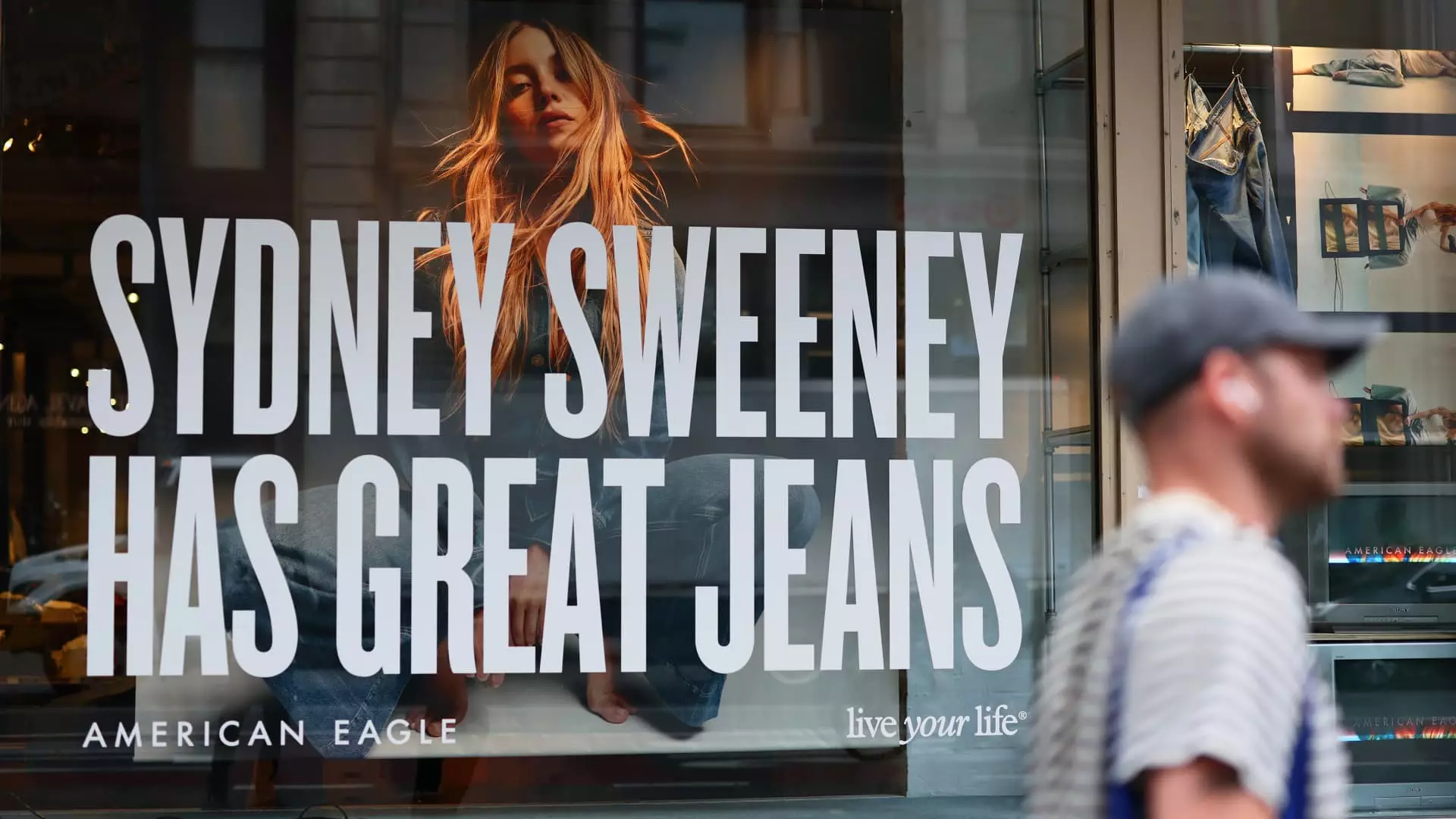In the highly competitive world of retail, brands often seek meteoric boosts through high-profile endorsements and strategic social media moments. American Eagle’s recent marketing stunt featuring Sydney Sweeney epitomizes this phenomenon—an audacious attempt to leverage celebrity appeal and conservative praise to garner consumer attention. While traditional marketing metrics might laud the immediate spike in search interest and stock surges, the underlying implications reveal a complex landscape where companies are increasingly vulnerable to cultural backlash and political weaponization.
President Trump’s endorsement, calling Sweeney’s ad “hot,” catapulted American Eagle’s stock by more than 15% instantaneously. This moment underscores a disturbing trend: in an era where political figures increasingly act as de facto brand ambassadors, the boundaries between commercial objectives and ideological signals blur dangerously. Trump’s recognition of Sweeney—a registered Republican—wasn’t merely a casual compliment; it was a political gesture that infused the campaign with a resonance among ideological supporters. Such moments are a gamble—daring companies to ignore the divisive political environment or risk alienating significant portions of their consumer base.
However, this tactic’s sustainability is questionable. The initial rally was short-lived, evidenced by the stock’s subsequent decline, revealing the frailty of reliance on political endorsements for long-term brand strength. It’s a reminder that social media’s volatile landscape can turn fleeting praise into public relations landmines, especially when cultural debates about gender norms, sexuality, and identity are so fiercely politicized.
The Clash of Cultural Narratives and Market Realities
American Eagle’s marketing campaign, featuring a slogan—“Sydney Sweeney has great jeans”—became a lightning rod for controversy. Critics argued it was veering into a double entendre—cynically suggesting that the ad was about more than just pants, but subtly about the actress’s physical attributes and genetics. This controversy exposes the perilous tightrope brands walk in modern advertising: one misstep can ignite accusations of sexism, objectification, or tone-deafness in a society more attuned than ever to issues of representation and authenticity.
Despite the company’s effort to deflect blame and insist the slogan was “about the jeans,” the wider backlash indicates a shift away from traditional marketing norms. The public’s increasing demand for genuine, inclusive messaging makes such superficial, sexualized promotions outdated and even offensive to many consumers. American Eagle’s silence—merely asserting that the ad was about jeans—illustrates a defensive attitude that rings hollow amid ongoing debates on cultural sensitivity. Success in modern advertising hinges on authenticity, not evasiveness.
In this context, the campaign becomes a case study in how corporate messaging fails when it underestimates the importance of social awareness. It also reveals how marketing decisions, driven by the desire to dominate headlines, risk fostering resentment and distrust among consumers who are tired of superficiality and old-fashioned gender stereotypes.
The Broader Economic and Cultural Implications
The American Eagle incident underscores a broader societal shift: brands are no longer just commercial entities but cultural actors entangled in the political and social fabric. The recent tumult around “woke” marketing campaigns—such as Bud Lite’s Dylan Mulvaney collaboration—serves as a cautionary tale. American Eagle’s experience illustrates that positioning itself in a perceived cultural middle ground, neither fully embracing progressive values nor resorting to reactionary conservatism, is a delicate balancing act.
Financially, the retailer continues to grapple with macroeconomic headwinds—rising tariffs, a cautious consumer, and internal merchandising failures—leading to declining stock prices and sluggish sales. The public relations fallout from the campaign, paired with broader economic pressures, complicates efforts to restore growth. Search interest may have surged temporarily, but translating that attention into sales is an entirely different challenge.
Moreover, American Eagle’s desperation to reignite growth highlights an unsettling reality: in today’s market, even well-established brands can become prisoners of cultural battles, where marketing is less about genuine engagement and more about reactive positioning. The risk is that such campaigns, instead of fostering loyalty, deepen consumer skepticism—especially when consumers view marketing through a lens that is increasingly politically conscious.

